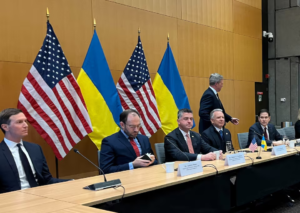The United States has repatriated two survivors of a deadly attack on a suspected narco-trafficking vessel in the Caribbean, sending them back to their home nations—Colombia and Ecuador—to be detained and prosecuted, President Donald Trump announced Saturday.
The move avoids Washington the complex legal problems of holding the men in U.S. military custody, an option that would have generated sensitive questions about how to classify and prosecute suspected narcotics traffickers under international law.
The two surviving terrorists are being returned to their countries of origin, Colombia and Ecuador, for detention and prosecution,” Trump wrote in a Truth Social message, adding intelligence reports identified the vessel as “loaded with mostly fentanyl and other illegal drugs.”.
The transnational cartel’s semi-submersible ship, normally used to avoid radar detection, was boarded Thursday as part of a Caribbean Sea anti-narcotics operation by U.S. defense officials.
An American military aircraft destroyed the ship, killing two of four crew members. The Americans then launched a helicopter rescue effort to recover the survivors, which were subsequently picked up by a U.S. Navy warship in the area.
Trump also published a 30-second video appearing to show the ship prior to its being attacked by what appears to be a minimum of one missile, but no official video or independent verification has yet emerged.
Legal Questions of Boundaries
Legal commentators cite that Washington’s move of returning the survivors avoids the potential quagmire.
Because drug dealing is a criminal activity and not an act of war, detaining such suspects under military jurisdiction might contravene international conventions formed, namely on the rights of combatants and jurisdiction.
“The U.S. government appears to be sidestepping the law gray area when civilian suspects are detained during a military operation,” quoted an expert in international law who spoke with Reuters.
Broader U.S. Military Escalation in the Caribbean
The deployment is one of a broader military build-up in the Caribbean as tensions between Caracas and Washington grow.
The White House has sent guided missile destroyers, F-35 aircraft, a nuclear-powered submarine, and some 6,500 troops to the region in the last week or so—moves which officials maintain are designed to cut down narcotics smuggling and deter “hostile actions” on the part of Venezuela’s government.
Just days ago, President Trump stated that he had cleared the Central Intelligence Agency to engage in secret operations within Venezuela, fueling speculation that Washington is working to weaken or overthrow President Nicolás Maduro from power.
Regional and International Reaction
The U.S. military actions have been strongly condemned by Venezuela as an assault on national sovereignty.
President Maduro has rejected any link with cocaine trafficking rings and accused Washington of using anti-drug policies as a pretext to justify a regime change.
“This is nothing more than an infringement of international law,” Venezuela’s U.N. Ambassador Samuel Moncada said, calling on the United Nations Security Council for a formal resolution on the legality of the U.S. raids.
In a letter to Reuters, Moncada requested the Security Council to issue a statement reaffirming Venezuela’s sovereignty and denouncing what he called “illegal acts of aggression by the United States.”.
Meanwhile, both Ecuadorian and Colombian governments have said nothing about repatriating their citizens. Both countries have been long-time supporters of U.S.-backed anti-drug operations, although domestically there has been growing criticism of their participation in American-led campaigns seen as politically motivated.
Controversy at Home Mounting
The latest incident is at least Trump’s fifth hit under his resumed Caribbean operations, which the government claims have taken 27 suspected traffickers’ lives since last August.
But Democratic lawmakers and human rights activists demand transparency, and they claim the strikes threaten to breach international humanitarian law if the targets weren’t legitimate combatants.
“This is further down the road of militarizing a law enforcement issue,” said one Democratic congressman, urging the administration to publish rules of engagement and provide oversight on deadly operations outside formally declared war zones.
With Washington doubling down on its anti-Maduro and anti-drug campaign, regional observers fret that the Caribbean could be the next hotspot of U.S. foreign policy—a poisonous brew of counter-narcotics, politics, and geopolitics at sea.




